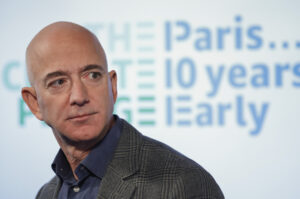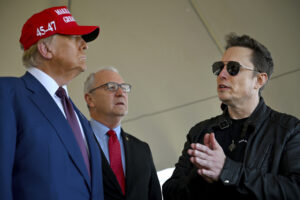Trump: Summit With Kim Is About Attitude, Not Preparation
The president dangles visions of normalized relations with the U.S., economic investment and more before North Korea, saying, "It's about willingness to get things done."WASHINGTON — Heading into his North Korea summit with characteristic bravado, President Donald Trump said Thursday that “attitude” is more important than preparation as he looks to negotiate an accord with Kim Jong Un to denuclearize the Korean Peninsula.
Preparing to depart Washington for next week’s meeting, Trump dangled before Kim visions of normalized relations with the United States, economic investment and even a White House visit. Characterizing the upcoming talks with the third-generation autocrat as a “friendly negotiation,” Trump said, “I really believe that Kim Jong Un wants to do something.”
Trump’s comments came as he looked to reassure allies that he won’t give away the store in pursuit of a legacy-defining deal with Kim, who has long sought to cast off his pariah status on the international stage. The North has faced crippling diplomatic and economic sanctions as it has advanced development of its nuclear and ballistic missile programs.
“I don’t think I have to prepare very much,” Trump said. “It’s about attitude. It’s about willingness to get things done.”
Declaring the summit to be “much more than a photo-op,” he predicted “a terrific success or a modified success” when he meets with Kim next Tuesday in Singapore. He said the talks would start a process to bring about a resolution to the nuclear issue.
“I think it’s not a one-meeting deal,” he said. Asked how many days he’s willing to stay to talk with Kim, Trump said, “One, two three, depending on what happens.”
Still he predicted he’ll know very quickly whether Kim is serious about dealing with U.S. demands.
“They have to de-nuke,” Trump said. “If they don’t denuclearize, that will not be acceptable. And we cannot take sanctions off.”
Trump, who coined the term “maximum pressure” to describe U.S. sanctions against the North, said they would be an indicator for the success or failure of the talks.
“We don’t use the term anymore because we’re going into a friendly negotiation,” Trump said. “Perhaps after that negotiation, I will be using it again. You’ll know how well we do in the negotiation. If you hear me saying, ‘We’re going to use maximum pressure,’ you’ll know the negotiation did not do well, frankly.”
At another point, he said it was “absolutely” possible he and Kim could sign a declaration to end the Korean War. The 1950-53 conflict ended with an armistice but not a formal peace treaty.
Trump spent Thursday morning firing off a dozen unrelated tweets — on the Russia investigation and other subjects — before meeting with Japanese Prime Minister Shinzo Abe to talk about summit preparations and strategy.
“I think I’ve been prepared for this summit for a long time, as has the other side,” he said. “II think they’ve been preparing for a long time also. So this isn’t a question of preparation, it’s a question of whether or not people want it to happen.”
Administration officials indicated that Trump actually was putting in preparation time. National Security Council spokesman Garrett Marquis noted the president met with Secretary of State Mike Pompeo and National Security Adviser John Bolton Thursday afternoon “to continue their strategic discussions” ahead of the summit.
Pompeo said he was confident the president would be fully prepared and dismissed reports of division inside Trump’s foreign policy team over the decision to embrace the meeting with Kim.
In his previous role as CIA director, Pompeo told reporters Thursday, “there were few days that I left the Oval Office, after having briefed the president, that we didn’t talk about North Korea.”
Pompeo said Kim had “personally” given him assurances that he was willing to pursue denuclearization and said U.S. and North Korean negotiating teams had made unspecified progress toward bridging the gap over defining that term as part of a potential agreement. He would not say whether Trump would insist that the North put an end to its chemical, biological and ballistic missile programs.
Pompeo said Trump’s approach is “fundamentally different” from prior administrations. “In the past, there’d been months and months of detailed negotiations and they got nowhere,” he said. “This has already driven us to a place we’d not been able to achieve.”
Since taking office, Trump has repeatedly accused his predecessors of failing to address the nuclear threat from a nation that launched its atomic program in the 1960s and began producing bomb fuel in the early 1990s. Past administrations have also used a combination of sanctions and diplomacy to seek denuclearization, but the results failed to endure.
Christopher Hill, the lead U.S. negotiator with North Korea during the George W. Bush administration, said a summit with the North had long been available to U.S. leaders.
“The fact was no U.S. president wanted to do this, and for good reason,” he said. “It’s a big coup for (the North Koreans), so the question is whether we can make them pay for it.”
Before he sits down with Kim, Trump must first face wary U.S. allies who question his commitment to their own security and resent his quarrelling with them on sensitive trade matters. Trump on Friday departs for a 24-hour stop in Canada for a Group of Seven summit of leading industrial nations.
French President Emmanuel Macron said Thursday that the international community supports Trump’s efforts to denuclearize the Korean Peninsula, but “if he does succeed in his negotiations with North Korea, we want him also to remain credible on the nuclear situation in Iran.” Trump pulled out of President Barack Obama’s nuclear accord with Iran over the objections of European allies.
Abe, for his part, pushed Trump to raise with Kim the issue of Japanese abductees held in North Korea. The Japanese leader wanted to make sure that Trump’s efforts to negotiate an agreement don’t harm Japan’s interests. Trump said Abe talked about the abductees “long and hard and passionately, and I will follow his wishes and we will be discussing that with North Korea absolutely.”
U.S. allies in the region have expressed concern that Trump’s push to denuclearize Korea could ignore the North’s sophisticated ballistic missile and chemical weapons programs.
___
AP writers Matthew Pennington in Washington and Gillian Wong in Beijing contributed.
Your support is crucial…With an uncertain future and a new administration casting doubt on press freedoms, the danger is clear: The truth is at risk.
Now is the time to give. Your tax-deductible support allows us to dig deeper, delivering fearless investigative reporting and analysis that exposes what’s really happening — without compromise.
Stand with our courageous journalists. Donate today to protect a free press, uphold democracy and unearth untold stories.






You need to be a supporter to comment.
There are currently no responses to this article.
Be the first to respond.